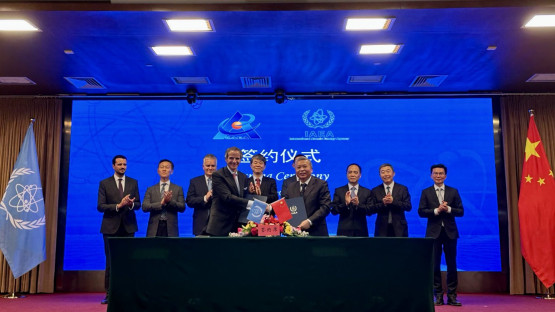As the IAEA supports efforts to accelerate the contribution of atomic energy to peace, health and prosperity around the world, China is an indispensable partner in this endeavour, said Rafael Mariano Grossi, IAEA Director General, at the start of a week-long visit to China. Mr Grossi is meeting with several high-level officials and visiting nuclear facilities and institutions in Beijing, Shanghai and Shandong, during his first official visit to the country.
“China is one of the IAEA’s most important partners and a global leader in nuclear energy,” Mr Grossi said. “This week’s agenda will cover the remarkable progress of China’s nuclear energy programme, cooperation in nuclear applications and indispensable exchanges on non-proliferation and nuclear safety.” China has more than 50 operational nuclear power units and 24 are under construction. By 2035, China’s nuclear power generation will account for 10 per cent of the country’s electricity generation, according to the latest Blue Book of China Nuclear Energy Development Report.
On Monday, Mr Grossi and other IAEA officials signed several agreements at the China Atomic Energy Authority (CAEA), which reflect the diverse scope of work between the IAEA and China. The agreements will strengthen cooperation on small modular reactors, nuclear fusion, and nuclear data, fuel cycle and waste management, as well as communication activities. An agreement was also signed in support of Rays of Hope, the IAEA initiative to promote cancer care for all by improving availability of radiotherapy services, medical imaging and nuclear medicine that are critical for detecting and curing this disease.
“I thank CAEA Chairman Zhang Kejian for the wide-ranging and open exchange on all areas of our rich bilateral agenda, from China’s nuclear energy programme to technical cooperation, non-proliferation and nuclear safety and security,” Mr Grossi said.
China, a member of the IAEA since 1984, is involved in 93 IAEA technical cooperation projects – spanning national, regional and interregional activities – in addition to 49 coordinated research projects. On Monday, Mr Grossi designated China’s Nuclear and Radiation Safety Centre as an IAEA Collaborating Centre, highlighting the country’s commitment to nuclear safety and the potential to strengthen bilateral relations. China is home to seven other IAEA Collaborating Centres: Beijing Research Institute of Uranium Geology for geological disposal of high-level radioactive waste; China Customs Radiation Detection Training Center for capacity building and facilitation of safe and secure trade using nuclear detection technologies; China Isotope & Radiation Corporation for production and application of medical radioisotopes, radiopharmaceuticals, industrial radiotracers and sealed sources; Chinese Academy of Agriculture Sciences for research, development and capacity building of nuclear techniques in food and agriculture; CAEA for research, development, testing and training on nuclear security detection and physical protection technologies; Sun Yat-sen University to develop the sterile insect technique to control mosquitoes; and Third Institute of Oceanography for isotopic oceanography.
On the outskirts of Beijing, Mr Grossi visited China’s State Nuclear Security Technology Centre with Liu Jing, Deputy Director of the CAEA. “Nuclear security is an essential component for the successful development of nuclear energy. China’s State Nuclear Security Technology Centre and the IAEA will further strengthen our collaboration, in particular with IAEA’s nuclear security centre in Seibersdorf,” Mr Grossi said. The Centre is part of the International Network for Nuclear Security Training and Support Centres (NSSC Network), which is coordinated by the IAEA and plays a key role in international cooperation and the sharing of best practices in nuclear security.
At the China Institute of Atomic Energy (CIAE), the main research institute of the China National Nuclear Corporation, Mr Grossi met with researchers and discussed the role of nuclear technology to address current challenges. “CIAE showcases impressive developments of nuclear technology in China, including the advanced research reactor and proton cyclotron,” Mr Grossi noted.
Over the next week, Mr Grossi will meet with representatives of China’s Ministry of Foreign Affairs, Ministry of Ecology and Environment, and the China International Development Cooperation Agency. He will visit Tsinghua University, Peking Union Medical College Hospital and the Shidao Bay Nuclear Power Plant, among other nuclear facilities and institutions.







